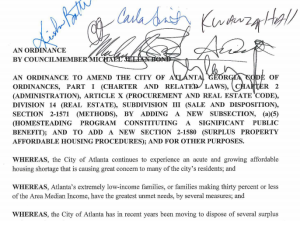Bond, Six Councilmembers Introduce Surplus Property Housing Policy in Atlanta (UPDATE 1)
 (APN) ATLANTA — At the Monday, July 17, 2017 Full Council Meeting, Atlanta City Councilman Michael Julian Bond (Post 1-at-large) introduced a new ordinance to amend the City of Atlanta’s policies relating to the sale of surplus real estate, in order to require that, where feasible, the properties be used to develop affordable housing units.
(APN) ATLANTA — At the Monday, July 17, 2017 Full Council Meeting, Atlanta City Councilman Michael Julian Bond (Post 1-at-large) introduced a new ordinance to amend the City of Atlanta’s policies relating to the sale of surplus real estate, in order to require that, where feasible, the properties be used to develop affordable housing units.
Ordinance:
The ordinance is co-sponsored by Carla Smith (District 1), Kwanza Hall (District 2), Ivory Lee Young (District 3), CT Martin (District 10), Keisha Lance Bottoms (District 11), and Andre Dickens (Post 3-at-large).
Councilwoman Natalyn Archibong (District 5) and Councilman Alex Wan (District 6) also support the paper.
APN’s News Editor–the present writer–drafted the ordinance for Councilmembers Bond and Natalyn Archibong (District 5), along with a research paper, “Utilizing Surplus City Property to Meet Atlanta’s Affordable Housing Needs: Best practices and proposed ordinance for the City of Atlanta.”
Report:
The ordinance has been referred to both Finance/Executive Committee and Community Development/Human Services (CD/HS) Cmte, which means that it will come up for discussion at both Committee Meetings next week:
- CD/HS Cmte 12:30 p.m., Tuesday, July 25, 2017; and
- Finance/Executive Cmte 1 p.m., Wednesday, July 26
The proposed Ordinance would require that any single-families homes–and half of the units in any multi-family project–be affordable to families in Atlanta making between 0 and 30 percent of the Area Median Income – or at monthly housing payments of up to about 400 dollars per month.
By helping developers to avoid the cost of land acquisition, the policy would make it more feasible to create truly affordable units for families at zero to 30 percent AMI – an income bracket of families in Atlanta who have the greatest unmet housing needs and who have been least served by Atlanta’s housing policies over the last decade.
Several cities and counties across the country have used surplus properties to develop affordable housing, by partnering with nonprofit developers.
King County, Washington, where Seattle is located, has produced over 400 units of affordable housing since enacting their policy.
Escambia County, Florida, where Pensacola is located, also has a surplus property program that has received national recognition.
In recent years, the City of Atlanta under the Kasim Reed administration, has moved to sell off several major real estate assets, including City Hall East, Atlanta Underground, Civic Center, and the former Turner Field site.
Only the Turner Field sale included any requirement for affordable housing, and even then it was only ten percent of the units affordable at eighty percent of the Area Median Income.
The ordinance would require that any time the City deem parcels to be surplus, that it send the list of surplus property to the Office of Housing, who would then determine whether the parcels are suitable for affordable housing.
In determining whether the parcels are suitable, the proposed Ordinance provides that the City would consider whether the parcels are appropriately shaped and sized for housing; whether the current zoning or land use is appropriate for housing; and whether the utility connections are available.
If any surplus properties are deemed suitable for affordable housing, then the Office of Housing would offer to sell the properties for one dollar to a list of Pre-Qualified Non-Profit Developers, who would have sixty days to offer to produce affordable units.
If no proposal is received in that time, the opportunity would be opened up to other non-profit developers and for-profit developers, who would be subject to the same affordability requirements.
The most recent Property Inventory produced by the City of Atlanta lists some 1,400 parcels, including at least one-third that are parks, public rights of way, or parcels serving other public purposes.
Of the remaining parcels, the report estimates–based on a review of several hundred parcels including by viewing the properties of Google Earth–that at least a few hundred potentially be feasible as affordable housing.
If adopted by the Council, the City policy would somewhat mirror the City’s expectations for how Atlanta Public Schools is to dispose of its surplus real properties. Currently, APS is considering how to use its surplus real properties to develop affordable housing, although it has not targeted its policy at 0 to 30 percent AMI.
The State of Georgia allows cities to dispose of its real properties, usually through a sealed bid process. However, the state law makes several exceptions allowing properties to be sold outside of the highest bid, including one exception for a homesteading program.
APN’s News Editor has drafted several ordinances for the Atlanta City Council that are now law, including Atlanta’s Affordable Housing Impact Statement legislation that went into effect in 2016.
(END / Copyright 2017 / Atlanta Progressive News)
Does this include housing for individuals with disabilities?